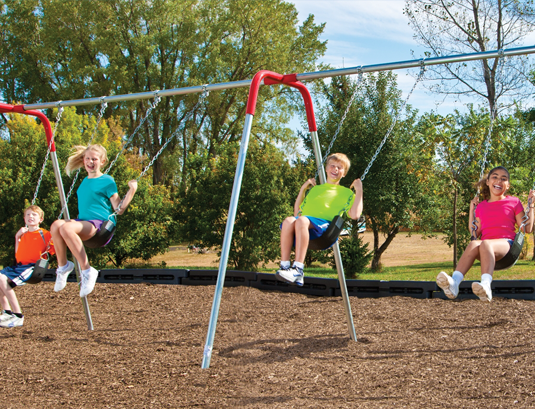Why Kids Need Playgrounds!

Playgrounds provide a safe place for children to use their boundless energy, and interact and have fun with their peers. As importantly, a well-designed playground gives kids an invaluable learning environment where they can develop their physical, social, emotional, and cognitive skills.
If what pioneering educator Maria Montessori famously said, that “Play is the work of children”, is true, then surely the child’s office is a well-designed playground.
Extensive research has been done on the importance of play to the healthy development of children and adolescents. If, as studies indicate, 75 percent of brain development occurs after a child is born, then play activities are absolutely essential to the healthy brain development of children and adolescents.
There’s no doubt that cognitive learning is stimulated by the pleasure and practice of play. It is equally true, say researchers, that play drives all learning— motor, emotional, and social.
What exactly is “play”?
Play is having fun in many different ways— physically— through running, dancing, jumping— or through fantasy and make-believe. Play can involve props— blocks and toys— or words, like singing or telling jokes. All these different modalities of play aid in the development of fine and gross motor skills, language, socialization, personal awareness, emotional well-being, creativity, problem-solving, and learning ability. Play that links sensory-motor, cognitive, and social-emotional experiences provides the ideal setting for brain development.
Children’s play activities stimulate and influence the connections made between the nerve cells. Play experiences help children to be active, make choices, and practice actions to achieve mastery.
While it’s important for children to be exposed to a wide variety of content (art, music, language, science, math, and social relations) during play activities, the opportunity to play on the structures of a well-designed playground seem to be especially important in encouraging healthy brain development in children of all ages.
How Playgrounds Encourage Healthy Brain Development
Build Motor Skills. The lack of physical fitness among children poses a danger to their health as adults. In fact, recent research indicates that children whose motor skills are poorly developed at age 5 will likely never develop adequate skills in this area.
Playground equipment is one avenue to promote physical activity of children. Visit playgrounds early and often in your child’s life to give them the opportunity to develop gross motor skills in an active environment. Playgrounds provide critical space for children to be given opportunities to move and be encouraged to advance into the next stage of development.
As your child’s gross motor skills improve, allow them to refine them on even more challenging equipment— walking over bridges and up and down ramps encourages balance, manipulating tactile panels promotes eye-hand coordination, and slides and swings allow children to practice rhythm and a higher level of gross motor skills. These and other types of playground activities give kids opportunities to practice reaching, grasping, and releasing, as well as encode and decode movement. They can then move from elementary to more advanced movements like running, hopping, dynamic balancing, axial, and lateral movement.
Encourage Language Development. Interactions with other children on the playground give kids the opportunity to express their ideas and feelings. Children must learn to use words to explain, negotiate, and compromise “rules of the game” in order to play successfully with their peers.
Promote Social Skills. Play structures promote social play because they provide children with places to communicate and congregate. A well-designed playground has nooks for one or two children, small areas for small groups, and larger areas for teams to congregate and communicate. Through the act of playing, children learn social and cultural rules, and experiment with various emotions.
While exposure to all kinds of play modalities is important to a child’s development, experts agree that frequent opportunities to use well-designed playgrounds are an essential factor in the development of children’s complex and integrated brains.




